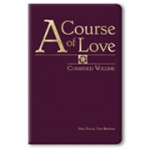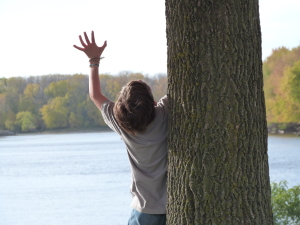Expand your reach!
In last Sunday’s post from the cabin, I said that I’d talk more this week on expression. I’m not sure what I had in mind. Was it just the desire to post some of the Course’s wonderful quotes on how essential self-expression is? Was it on the link between who we are and sharing, or expressing, who we are? Was it on what can seem new to spiritual seekers—the idea of allowing what we feel and expressing a range of feelings, talents, desires?
As I went to some of my favorite passages, I realized, once again, that Jesus does us such a  service by talking of how things feel. I’ve concluded that one of the reasons that he does this, is to help us let go of the pattern of learning. In The Dialogues chapter on The Territory of Conscious Awareness, Jesus talks of how it feels to discover a talent, which I relate to as that, “Oh my gosh, I’m good at this!” feeling. Or that, “Wow, this feels as natural as breathing,” feeling. I have felt it about writing. One of my daughters felt it about singing. My grandson may well be feeling it as he swims. Like it or not, we seem to be naturally good at some things and to struggle with others. We enjoy some activities and not others (something I’m reminded of as the snow falls and outdoor sports commence—as they were never my cup of tea). And I’d say that when we desire to perfect a talent, let’s say of playing the piano, it might be difficult, but not nearly as much of a struggle as it would be to play the piano if you had no desire to do so; if, as a kid, your mother made you. As parents we often expose our children to all kinds of things—and we do it with this idea that, through exposure, a child might “discover” a love (or a talent) … if not for piano, maybe for the guitar. If not for skiing, maybe for running.
service by talking of how things feel. I’ve concluded that one of the reasons that he does this, is to help us let go of the pattern of learning. In The Dialogues chapter on The Territory of Conscious Awareness, Jesus talks of how it feels to discover a talent, which I relate to as that, “Oh my gosh, I’m good at this!” feeling. Or that, “Wow, this feels as natural as breathing,” feeling. I have felt it about writing. One of my daughters felt it about singing. My grandson may well be feeling it as he swims. Like it or not, we seem to be naturally good at some things and to struggle with others. We enjoy some activities and not others (something I’m reminded of as the snow falls and outdoor sports commence—as they were never my cup of tea). And I’d say that when we desire to perfect a talent, let’s say of playing the piano, it might be difficult, but not nearly as much of a struggle as it would be to play the piano if you had no desire to do so; if, as a kid, your mother made you. As parents we often expose our children to all kinds of things—and we do it with this idea that, through exposure, a child might “discover” a love (or a talent) … if not for piano, maybe for the guitar. If not for skiing, maybe for running.
Jesus uses this idea to help us understand that we have each already experienced something that existed prior to the time of learning. Something that was “there” in us prior to our lessons or even our exposure. With such ideas, he brings the idea of “awareness” down from a lofty or esoteric practice and into the ground of our being as who we are.
I’m glad I was led to this because, as I prepare the audio files of A Course of Love, I am more aware than ever before of the differences between the first half of this Course and the last half of this Course. In 8.8 of The Dialogues, Jesus gives one clue to the source of this difference:
Between the Course and the Treatises, all of what you needed to learn was put forth. What we are now doing is discussing what was taught from the realm of wholeheartedness. What was learned was only able to be learned because you chose to become the wholehearted. You chose to join mind and heart and it was done. But you do not yet know how to rid yourself of former patterns. Your mind, while it no longer wants to cling to known patterns, is confronted with them constantly. Thus your heart still seems to battle with the supremacy of mind.
D:8.9 So what we are attempting to do is to open the mind to the wisdom of the heart with these dialogues. As the mind opens and accepts the new, the art of thought will become your new means of thinking. What has been learned will become an ability to think wholeheartedly, or with mind and heart in union, and then that ability will transcend ability and wholehearted will become what you are, and wholeheartedness your sole means of expression.
D:8.10 The self and the expression of self that comes from any place other than wholeheartedness is not the true Self or the true expression of the Self but the self-expression that arises from separation. Self-expression that arises from separation is still valuable, as it is a sign of yearning toward the true Self and the true expression of the Self. Thus where you have desired to express yourself in the past is very likely linked to the natural ability or talent you did not have to learn, to that which was given and available just a step beyond where the separated self could reach.
D:8.11 Expand your reach!
D:8.7 While discovery of the new will naturally include much that goes beyond what you now think of as your natural talents or abilities, the place or Source of your natural talents or abilities is a place from which to start building your awareness of what is available or given—of what is but awaiting your discovery and conscious awareness.
As I read this, I remembered a segment from Chapter 2 of A Course of Love that perhaps prepared us for this time. We’re hearing about the ways of the mind, and that with the mind we have been in a learning process that stands apart from who we are. We think we can know without that knowing being who we are; that we can love without love being who we are.
But Jesus concludes, in C:2.16 that, “Nothing stands apart from your being. Nothing stands alone.”



How absolutely lovely. Yes, that being “caught.” That is a great way to express it. It is almost as though we don’t even need to know what it is we’re expressing. Yet in expressing it…we know it! We share it.
I love that ACIM quote too.
Wonderful blogs (Expression and linked to Gifted with Threads). Audiofiles? Yes! Yes! Yes!
You talk about talents ‘n treasures. Which reminds me of my favourite ACIM statement (Review V) ” The Self from Which I call to you is but your own.”
In music one can experience the talent of say, LangLang, playing Chopin, divinely. It is the recognition of such talent that makes us to become the artist, as we are connected from heart to heart, from the Self to the Self, joining the divine Chorus. The experience of beauty, it being music, painting, nature, a baby’s face or the smile of one’s life companion, all connect us to that “something existing prior to learning”.
I recently joined a local choral society and, at times, have the privilage of getting “caught” by certain harmonies that completely choke me up….an ancient memory? …something existing prior to coming here?